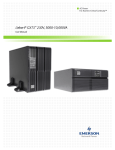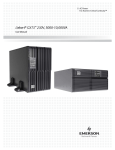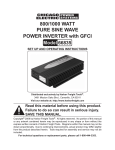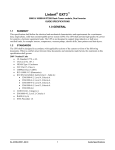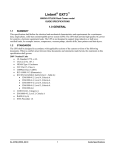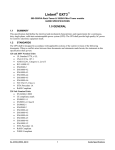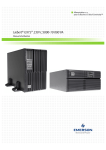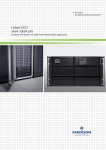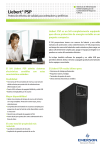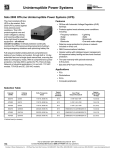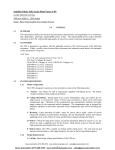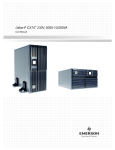Download Liebert GXT3 - CNET Content Solutions
Transcript
Liebert® GXT3™ 10000VA RT230 Rack-Tower model GUIDE SPECIFICATIONS 1.0 GENERAL 1.1 SUMMARY This specification shall define the electrical and mechanical characteristics and requirements for a continuousduty, single-phase, solid-state uninterruptible power system (UPS). The UPS shall provide high-quality mains power for sensitive, electronic equipment loads. The UPS is not designed to support large inductive or half-wave rectified loads, for example: motors, compressors, vacuum pumps, electric drills, laser printers and hair dryers. 1.2 STANDARDS The UPS shall be designed in accordance with applicable sections of the current revision of the following documents. Where a conflict arises between these documents and statements made herein, the statements in this specification shall govern. 230V Nominal Units Safety-IEC62040-1:2008 version Emission (Low limits - conducted and radiated): IEC/EN/AS 62040-2 2nd Ed (Cat2 - Table 1) CISPR22 Class A (RFI) IEC/EN/AS61000-3-12 (Harmonics) Immunity (High commercial and light industry immunity levels for enclosure, power, signal and control ports): IEC/EN/AS 62040-2 2nd Ed (Cat 2 - Table 6) for IEC/EN/AS 61000-4-2 Electrostatic discharge 61000-4-3 Radiated E-RFI fields 61000-4-4 Fast E transients 61000-4-5 Surges/Lightning 61000-4-6 Conducted RFI Transportation and Shipping- ISTA Procedure 1A Certification C-Tick (Liebert in Australia / New Zealand will pursue certification) WEEE and RoHS (6 of 6) The 230 VAC UPS units shall be TUV listed and shall bear the CE compliance mark and Australia C-tick (C√) mark. 1 Guide Specifications Liebert GXT3-10000RT230 1.3 SYSTEM DESCRIPTION 1.3.1 Modes of Operation The UPS shall be designed to operate in the following modes: A. Normal - During normal operation, mains power shall provide energy to the UPS. The filters, the power factor correction circuit and the inverter shall process the mains to provide computer-grade power to connected loads. The UPS shall maintain the batteries in a fully charged state. B. Battery - The UPS shall enter Battery mode if there is an extreme power surge, extreme power sag or mains failure. The battery system shall supply power through the DC-to-DC converter to the inverter to generate computer-grade power for the connected load. C. Recharge - When the UPS is supplied with qualified mains power, the UPS shall charge connected internal and optional external battery cabinets (if connected). D. Internal Bypass - Bypass mode shall provide an alternate path for mains power to the connected load in the unlikely event of a UPS malfunction, such as overload, overtemperature or an internal circuit failure. E. Maintenance Bypass - Maintenance Bypass mode shall provide an alternate path for mains power to the connected load during UPS maintenance or UPS replacement. F. Automatic Restart - Upon restoration of mains power and after a complete battery discharge, the UPS shall be able to automatically restart and resume supplying power to the critical load based on the settings in the supplied configuration program. 1.3.2 Design Requirements A. Voltage: Nominal mains/output voltage specifications of the UPS at rated load shall be: Mains The UPS shall operate at 230V, 50Hz without the use of selector switches or voltage taps. Mains wiring must be 2-wire (L, N) plus earth ground. Output Output voltage shall be present at terminals L and N. The output voltage shall be automatically set to match mains voltage upon initial startup. The UPS shall be configurable using the included configuration program to provide the following alternate voltages: 220V or 240V, all voltages ±3% at 50Hz. (If the UPS is started on battery with no mains power present, the default output voltage shall be 230V, 50Hz from the factory. After the UPS has been started from mains, the output voltage/frequency shall match the last known mains voltage/frequency that was applied.) B. Output Load Capacity: Specified output load capacity of the UPS shall be: 10000RT230 models VA Watts VAC Output 10000 9000 220 / 230 / 240 C. Internal Battery: Valve-regulated, non-spillable, lead acid cells. D. Battery Reserve Time: Minimum 3 minutes with an ambient temperature of 25°C (77°F). E. Battery Recharge: The UPS shall contain a battery charger designed to prolong battery life. Recharge time for UPS internal batteries shall be 3 hours maximum to 90% capacity after a complete discharge into full load. 2 Guide Specifications Liebert GXT3-10000RT230 1.3.3 Performance Requirements 1.3.3.1 Mains to UPS A. Voltage: The point at which the UPS transfers to battery operation shall be dependent on the amount of load that the UPS is supporting. The following ranges define conditions when the UPS will transfer to battery (Transfer) and when it returns to normal operation from mains (Comeback): Low Line Voltage Range Low Line Voltage 100% to 91% 90% to 71% 70% to 31% 30% to 0% GXT3-5000RT230 GXT3-6000RT230 176 ± 5.0VAC 188 ± 5.0VAC 159 ± 5.0VAC 171 ± 5.0VAC 139 ± 5.0VAC 151 ± 5.0VAC 100 ± 5.0VAC 112 ± 5.0VAC 185 ± 5.0VAC 197 ± 5.0VAC 167 ± 5.0VAC 179 ± 5.0VAC 139 ± 5.0VAC 151 ± 5.0VAC 100 ± 5.0VAC 112 ± 5.0VAC L/L Transfer L/L Comeback L/L Transfer L/L Comeback L/L Transfer L/L Comeback L/L Transfer L/L Comeback High Line Voltage Range High Line Voltage 230V Models High Line Transfer 280 ± 5.0VAC High Line Comeback 268 ± 5.0VAC B. Frequency: The UPS shall auto-sense mains frequency of 50Hz or 60Hz when first powered up and shall use this frequency as the default output frequency. Once started the mains frequency operating window shall be 40-70Hz without going to batteries. The UPS shall be capable of cold start with a default output frequency of 50Hz. C. Mains Power Factor: >0.99 lagging at rated load. D. Mains Current reflected distortion: 5% THD maximum at rated load. E. Mains Current Ratings: UPS Model # VA Watt Hz VAC Total Amps GXT3-10000RT230 10000 10000 10000 9000 9000 9000 50 50 50 220 230 240 45.5 43.5 41.7 F. Surge Protection: The UPS shall utilize metal oxide varistors (MOVs) rated at 510V. G. Electrical Specifications: UPS Model Recommended (Maximum) External Overcurrent Protection Recommended Wire (Including Earth Ground Wire) (75°C Copper Wire) GXT3-10000RT230 63A 10mm (6AWG) 2 3 Maximum Wire Accepted by Terminal Block 2 16mm (4AWG) Terminal Tightening Torque 2.26 Nm (20 in-lb) Guide Specifications Liebert GXT3-10000RT230 1.3.3.2 Mains Output, UPS Inverters A. Voltage Configuration: 50Hz, single-phase, 2-wire-plus-ground. Default setting 230V. Output L-N voltage shall be selectable via the included UPS configuration program. Optional settings shall be 220V or 240V. The UPS shall adjust sinewave amplitude to produce the selected voltage to match the mains. B. Voltage Regulation: L-N: ±3% steady state. C. Frequency Regulation: ±3.5Hz synchronized to mains. ±0.1Hz free running or on battery operation. D. Frequency Slew Rate: 1.0Hz per second maximum E. Load Power Factor Range: 0.65 lagging to 1.0 (unity) F. Voltage Distortion: Sinusoidal Waveform; ≤3% total harmonic distortion (THD) into a 100% linear load; ≤5% THD into a 100% non-linear load with a crest factor ratio of 3:1. G. Inverter Overload Capability: Overload Percent Duration Inverter shall support rated load 105% to 130% 131% to 150% 151% to 200% 1 minute 10 seconds 1 second >200% (impact load) At least 5 cycles H. Voltage Transient Response: ±7% on-line or Battery mode for 0-100-0 % loading of the UPS, ±4% on-line or Battery mode for 20-100-20 % loading of the UPS. I. Transient Recovery Time: To nominal voltage within 166 milliseconds. J. Efficiency: 92% AC-AC 4 Guide Specifications Liebert GXT3-10000RT230 1.4 ENVIRONMENTAL CONDITIONS A. Ambient Temperature Operating: 0°C to 40°C (32°F to 104°F) Storage: -15°C to +50°C (5°F to 122°F) GXT3-240RTVBATT: 20°C (68°F) for optimum battery storage. Battery systems should not be stored for extended periods above 25°C (77°F). B. Relative Humidity Operating: 0 to 95% non-condensing Storage: 0 to 95% non-condensing C. Altitude Up to 1000m (3,281 ft) at 30°C (86°F) without power derating when operated within the temperature specified in Section 1.4, Item A. Ambient temperature shall be derated by 5°C (9°F) for each additional 500m (1,640 ft.) above 3,000m (9,843 ft.). D. Audible Noise Noise generated by the UPS under normal operation shall not exceed 55dBA at 1 meter (3.2 ft.) from the rear 50 dBA, at 1 meter (3.2 ft.) from the front or sides. E. Electrostatic Discharge The UPS shall be able to withstand an electrostatic discharge compliant to EN61000-4-2, level 4, Criteria A, without damage and shall not affect the connected load. 1.5 USER DOCUMENTATION The specified UPS system shall be supplied with a Safety Warning Sheet. The UPS and Configuration Program user manual shall be on an included CD. The user manual shall include installation drawings and instructions, a functional description of the equipment with block diagrams, safety precautions, illustrations, step-by-step operating procedures, general maintenance guidelines, troubleshooting information and product specifications. 1.6 WARRANTY The UPS shall be warranted against defects in materials and workmanship for two (2) years. Optional one (1) and three (3) year full coverage extended warranties shall be available from Emerson Network Power. 1.7 QUALITY ASSURANCE 1.7.1 Manufacturer’s Qualifications More than 30 years experience in the design, manufacture and testing of solid-state UPS systems. The manufacturer shall be certified to ISO 9001:2008. 1.7.2 Factory Testing Before shipment, the manufacturer shall fully and completely test the system to ensure compliance with the specification. These tests shall include operational discharge and recharge tests on the internal battery to ensure performance. 5 Guide Specifications Liebert GXT3-10000RT230 2.0 PRODUCT 2.1 FABRICATION All materials and components making up the UPS shall be new, of current manufacture and shall not have been in prior service except as required during factory testing. All relays shall be provided with dust covers. 2.1.1 Wiring Wiring practices, materials and coding shall be in accordance with the requirements the standards listed in Section 1.2 and other applicable codes and standards. All wiring shall be copper. 2.1.2 Cabinet The UPS unit shall be composed of: mains PFC converter, battery charger, dual-inverter, mains filter and internal bypass circuit; and batteries consisting of the appropriate number of sealed battery cells; and shall be housed in a rack-tower NEMA type 1 enclosure and shall meet the requirements of IP20. The UPS cabinet shall be cleaned and painted RAL 7021 Black. 2.1.3 Matching Battery Cabinets The optional Rack-Tower battery cabinet shall contain valve-regulated, non-spillable, lead acid cells, housed in a separate cabinet that matches the UPS cabinet styling. The cabinet shall be cleaned and painted Black RAL 7021. The external battery system shall be sized to provide an additional 8-13 minutes of reserve power at rated load. The matching battery cabinet shall include an 18" (0.45m) detachable, molded interconnect cable, circuit breaker overcurrent protection and provisions for daisy-chain connection of additional battery cabinets. The model numbers, dimensions and weight information of the UPS cabinet and optional external battery cabinet shall be as follows: Model GXT3-5000RT230 GXT3-240RTVBATT (Optional External Battery) Rack Dimensions W x D x H, in. (mm) Tower Dimensions W x D x H, in. (mm) 430 x 581 x 261 (16.9 x 22.9 x 10.3) 430 x 581 x 173 (16.9 x 22.9 x 6.8) 261 x 581 x 430 (10.3 x 22.9 x 16.9) 173 x 581 x 430 (6.8 x 22.9 x 16.9) Weight lb. (kg) 70 (154.3) 65 (143.3) 2.1.4 Cooling The UPS shall be forced air cooled by internally mounted, continuous fans. Fan power shall be provided from the internal DC supply. Air intake shall be through the front of the unit, and air exhaust shall be out the rear of the unit. 6 Guide Specifications Liebert GXT3-10000RT230 2.2 COMPONENTS 2.2.1 Mains Converter 2.2.1.1 General Incoming mains power shall be converted to regulated DC power by the mains converter for supplying DC power to the inverter. The mains converter shall provide mains power factor correction (PFC) and mains current distortion reduction. 2.2.1.2 Mains Current Limit The mains shall use the power necessary to operate the load attached to the output before going to batteries. The UPS shall not use electronic mains current limiting. The UPS shall include a 1-pole switch-type 32A mains breaker. 2.2.1.3 Mains Protection The UPS shall have built-in protection against overcurrent and overvoltage conditions including low-energy lightning surges, introduced on the primary mains source. The UPS shall sustain mains surges without damage per criteria listed in 61000-4-5 Surges/Lightning. 2.2.1.4 Battery Recharge The UPS shall contain a battery charger designed to prolong battery life. The battery shall be constant current charged to restore capacity, then shall be constant voltage charged to maintain the battery in a fully charged state. Recharge time for the internal battery shall be 3 hours maximum to 90% capacity (full load discharge rate). There shall be DC overvoltage protection so that if the DC voltage exceeds the pre-set limit, the inverter shall shut down automatically and the critical load shall be transferred to internal bypass. 7 Guide Specifications Liebert GXT3-10000RT230 2.2.2 Inverters 2.2.2.1 General The UPS inverters shall be of a pulse-width-modulated (PWM), IGBT design capable of providing the specified mains output. The inverters shall convert DC power from the mains rectifier output or the battery into precise sinewave mains power for supporting the critical load. 2.2.2.2 Overload The inverter shall be capable of supplying current and voltage for overloads exceeding 100%, and 105-130% for 1 minute, 131-150% 10 seconds, 151-200% for 1 seconds, and up to >200% for 5 cycles of full load current. A visual indicator and audible alarm shall indicate overload operation. For greater currents or longer time duration, the inverter shall have electronic current-limiting protection on the output to prevent damage to components. The inverter shall be self-protecting against any magnitude of connected output overload. Inverter control logic shall sense and disconnect the inverter from the critical mains load without the requirement to clear protective devices. 2.2.2.3 Inverter DC Protection The inverter shall be protected by the following DC shutdown levels: DC Overvoltage Shutdown DC Undervoltage Shutdown (End of Discharge) 2.2.2.4 Output Frequency An oscillator shall control the output frequency of the UPS. The inverter shall maintain the output frequency to ±0.1Hz of nominal frequency during Battery mode, Frequency Converter mode or when otherwise not synchronized to the mains source. 2.2.2.5 Output Protection The UPS inverter shall employ electronic current limiting circuitry for protection during Normal mode and battery operation and the UPS shall employ mains circuit breaker protection during Bypass mode operation. 8 Guide Specifications Liebert GXT3-10000RT230 2.2.3 Display and Controls 2.2.3.1 General The UPS shall be provided with a microprocessor-based control and a status display section designed for convenient and reliable user operation. The monitoring functions such as status and alarm indicators shall be displayed on a front-panel LED display. 2.2.3.2 UPS Status Indicators The UPS shall include five individual LED status indicators and three rows of LEDs to indicate UPS load and battery capacity. An audible alarm shall be used in conjunction with the visual indicators to indicate to the operator a change in UPS operating status. All audible alarms can be silenced, with the exception of low battery, bypass reminder and missing batteries at startup alarms. Once silenced, the audible alarm shall not sound until a new alarm condition is present. Standard LED indicators are described below: Load Level indicators: 5 total: 4 green and 1 amber, for the output. The Load Level indicators shall display the approximate load level at all times. Battery Level indicators: 5 green LEDs. The Battery Capacity LEDs shall display the approximate level of battery reserves. Fault indicator: 1 red LED. The Fault indicator LED shall illuminate if the UPS detects an internal problem. One or more of the Battery Capacity indicators may be illuminated to aid in diagnostics. Mains indicator: 1 green LED. The Mains indicator LED shall be illuminated when mains power is available and falls within the mains specification. Inverter indicator: 1 green LED. The On Inverter indicator LED shall be illuminated when the UPS inverter is operating and supplying power to connected loads. Bypass indicator: 1 amber LED. The On Bypass indicator LED shall be illuminated when the bypass source is supplying power to connected loads. On Battery indicator: 1 amber LED. The On Battery indicator LED shall be illuminated when the mains is out of the acceptable operating range. 2.2.3.3 On-Standby-Off Controls UPS startup and shutdown operations shall be accomplished by the ON and STANDBY push buttons on the front panel of the UPS. The ON push button shall be a means to turn the UPS on and shall also serve as a means to manually test the battery. The STANDBY push button shall allow manual transfers of the load from the inverter to bypass power. Pressing the STANDBY push button twice within 4 seconds while on Bypass will cut off power to the output sockets and connected loads. 9 Guide Specifications Liebert GXT3-10000RT230 2.3 ON-LINE BATTERY TEST The UPS shall feature an automatic battery test with the factory default test interval set at every 2 weeks. The battery test shall ensure the capability of the battery to supply power to the inverter while loaded. If the battery fails the test, the UPS shall display a warning alarm to indicate the internal batteries need replaced and resume operation without disturbing the load. The battery test feature shall be user accessible by the push button on the front of the unit. 2.4 BYPASS 2.4.1 General A bypass circuit shall be provided as an integral part of the UPS. The bypass shall have a make-before-break transfer, shall have a maximum detect and transfer time of 4-6 milliseconds and shall be a double-pole device. The bypass shall be configured to wrap around the PFC converter, battery charger, DC-DC converter, inverter and battery. The bypass circuit shall use the rear-panel mounted UPS mains circuit breaker and route bypass power through the UPS mains filters and surge suppression circuit. The bypass circuit default position shall be in the Bypass mode (mains). 2.4.2 Automatic Transfers The transfer control logic shall activate the bypass automatically, transferring the critical mains load to the bypass source, after the transfer logic senses one of the following conditions: UPS overload UPS overtemperature PFC failure Inverter failure DC bus overvoltage Once the overload condition is reduced, the load shall be automatically transferred back to inverter power. An overtemperature requires manual transfer back to inverter power after cooling. 2.5 INTERNAL BATTERY Valve-regulated, non-spillable, lead acid cells shall be used as a stored-energy source for the specified UPS system. The battery kit shall be internal to the UPS cabinet and sized to support the inverter at rated load and power factor with an ambient temperature of 25°C (77°F) for a minimum of 5 minutes reserve time. The expected life of the battery shall be 3-5 years or a minimum 250 complete discharge cycles at ambient temperature of 25°C (77°F). To promote battery service life and eliminate over-discharge of the battery, the end-of-discharge DC shutdown voltage shall be automatically adjusted by the microprocessor based upon the percentage load at the onset of battery operation. 2.6 OUTPUT DISTRIBUTION Output distribution shall be integral to the UPS cabinet and located on the rear of the unit. Distribution shall be provided with break-before-make maintenance bypass switch to allow for complete shutdown and isolation of the UPS for service without powering down the connected loads. Maximum transfer time of the maintenance bypass switch shall be 4-6ms. Standard output distribution configuration shall be: Distribution Model PD2-CE10HDWRMBS Mains Connection Output Load Connections Maintenance Bypass Hardwire Terminals, 2-wire-plus-ground, 8AWG max Four (4) C13 sockets Four (4) C19 sockets Included 10 Guide Specifications Liebert GXT3-10000RT230 2.7 ON-BOARD COMMUNICATION The Liebert GXT3 shall offer multiple communication options such as: A. USB: All models shall work with the Power Management system in Microsoft® Windows® 2000, Windows XP, Windows Vista®, Linux and Mac OS® X. B. Remote Emergency Power Off (REPO): The UPS shall be equipped with rear-panel terminal connections for interface with either a normally open (N.O.) or normally closed (N.C.) field-supplied switch. The remote emergency power off function shall allow the user to disable all UPS outputs in an emergency situation. Connections must not exceed NEC Class 2 limits. Activation of the REPO circuit shall disable the UPS until the following occurs: REPO contacts are reset. User restart of the UPS using the front control panel. C. Terminal Block Communication: includes 8 pins Pin 1&2 3&4 5&6 7&8 Definition Low Battery Warning On Battery Warning Any Mode Shutdown Battery Mode Shutdown D. Liebert IntelliSlot® Port Simultaneous communication shall be available via terminal block (EPO), USB and Liebert IntelliSlot. 2.8 LIEBERT INTELLISLOT COMMUNICATION OPTIONS The UPS shall include one Liebert IntelliSlot communication port to allow the operator to field-install optional Liebert IntelliSlot communication cards. Liebert IntelliSlot cards may be installed during any state of UPS operation (On, Standby or Off states). Available Liebert IntelliSlot options are described below. Liebert IntelliSlot Web Card (IS-WEBCARD) The optional Liebert IntelliSlot Web Card shall deliver SNMP and Web management to the UPS when connected to any 10 or 100 Mbit Ethernet network. The card shall support 10 and 100 Mbit Ethernet and shall provide for in-the-field upgrade of SNMP firmware. The kit shall include the Liebert IntelliSlot card, MIB, configuration cable and user manual. Once the card is installed, serial communication shall be disabled in the DB9F connector; however, the photo-coupler signals (On Battery and Low Battery) shall remain active. Liebert IntelliSlot Relay Interface Card (RELAYCARD-INT) The optional Liebert IntelliSlot Relay Interface Card shall provide contact closure for remote monitoring of alarm conditions in the UPS, delivering signals for On Battery, On Bypass, Low Battery, Summary Alarm, UPS Fault and On UPS. The contacts shall be rated for 24VAC or 24VDC at 1A. Connection shall be to a DB25F connector with cable provided by the end user. 11 Guide Specifications Liebert GXT3-10000RT230 2.9 LIEBERT GXT3 CONFIGURATION PROGRAM An included Microsoft Windows-based (Windows 95 or later) Configuration Program and cable shall allow configuration of UPS features and operating parameters to meet specific application requirements, if required. Options that are configurable via this program shall include: Select one of five output voltages to match mains voltages of 220/230/240. Enable / Disable Auto-Restart. Select frequency converter operation with a fixed output frequency of 50 or 60Hz. Bypass is disabled during Frequency Converter mode. Set the Low Battery Warning alarm time from 2 to 30 minutes. Disable the Auto-Battery test. Set the Auto-Battery test interval to 7, 14, 21 or 28 days. Select the number of external battery cabinets connected to the UPS to adjust the remaining run-time calculations reported by the UPS Liebert software products. Modify the shutdown setting of the Any Mode Shutdown. 12 Guide Specifications












